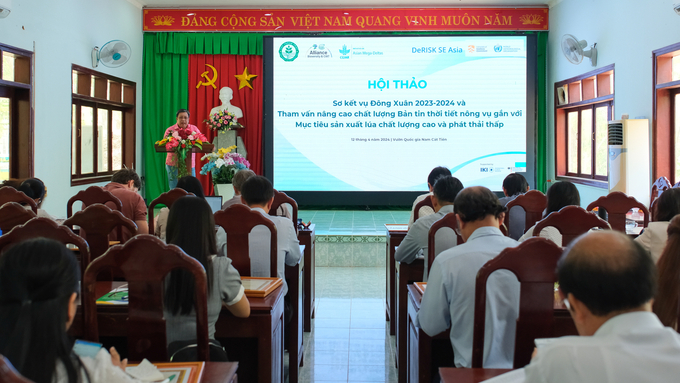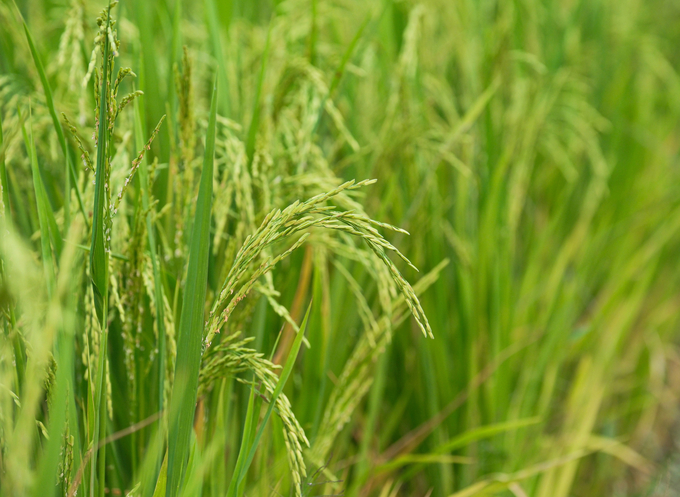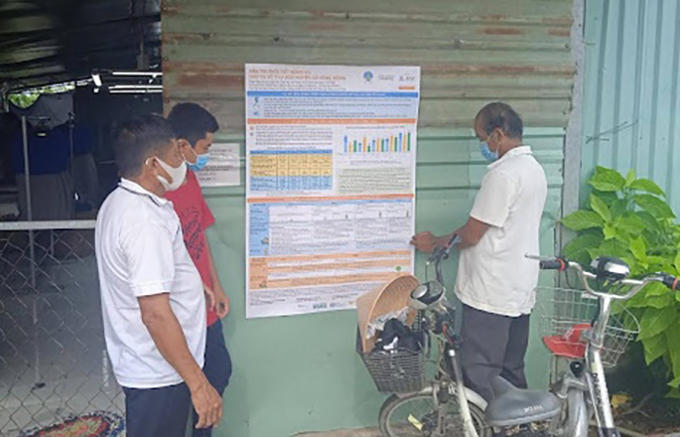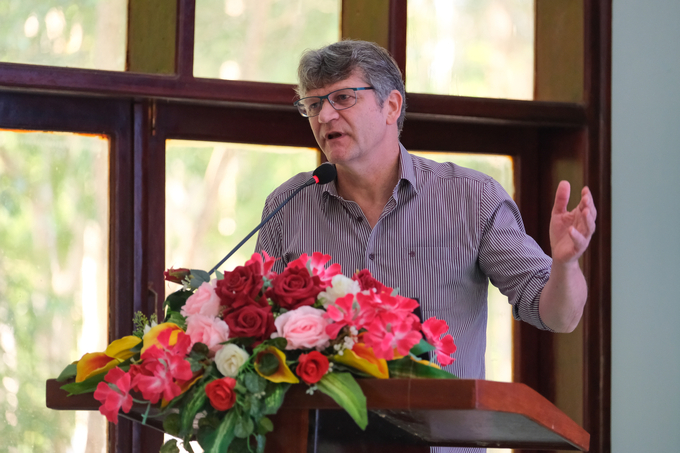June 19, 2025 | 00:10 GMT +7
June 19, 2025 | 00:10 GMT +7
Hotline: 0913.378.918
June 19, 2025 | 00:10 GMT +7
Hotline: 0913.378.918

The workshop to review the 2023-2024 winter-spring crop outcomes in the Mekong Delta convened on April 12 at Nam Cat Tien National Park (Dong Nai). Photo: Quynh Chi.
On April 12, in Dong Nai, the Department of Crop Production (DCP – Ministry of Agriculture and Rural Development), in collaboration with the International Center for Tropical Agriculture (CIAT), organized a workshop to summarize Agro-Climatic Bulletins for the 2023 winter-spring crop in the Mekong Delta and strategize for quality enhancement. The session focused on aligning Agro-Climatic Bulletins to produce high-quality rice with minimal emissions.
As per preliminary assessments from the DCP, the winter-spring rice cultivation area for 2023-2024 in the Mekong Delta is approximately 1,488 thousand hectares, marking a rise of 10.3 thousand hectares. Productivity was maintained at 72.74 tons per hectare, matching last year's figures, culminating in a total rice output of 10,830,950 tons.
Mr. Le Thanh Tung, DCP Deputy Director, highlighted the Mekong Delta's rice productivity, consistently surpassing 7 tons per hectare in past seasons. He emphasized two crucial aspects of this achievement.
"Firstly, Vietnamese farmers are swiftly adopting novel farming techniques. The disparity in productivity between different areas is diminishing, indicating a more standardized approach to rice cultivation. The increasing professionalism of the rice industry is evident as fields exhibit less variance, with farmers across Mekong Delta provinces embracing scientific farming methods and utilizing similar seed varieties under comparable climatic conditions," analyzed the Deputy Director.
Additionally, Mr. Le Thanh Tung underscored the severity of this year's drought and saltwater intrusion, comparable to conditions witnessed in 2015-2016. Nevertheless, judiciously developed production plans enabled the winter-spring crop to thrive, with timely and appropriate irrigation and nourishment resulting in yields surpassing the norm.

Rice output in the winter-spring crop of 2023-2024 in the Mekong Delta surpasses 10.8 million tons.
The winter-spring crop of 2023-2024 marks the inaugural phase of the Agro-Climatic Bulletins initiative, now being implemented across 13 provinces in the Mekong Delta. This technical solution, aimed at supporting smallholder farmers in adapting to climate change, has been spearheaded by CIAT and transferred to the Provincial Departments of Crop Production and Plant Protection officials to tailor forecasts for each province.
These bulletins, disseminated to farmers on a seasonal and monthly basis, undergo a 10-day pilot in select localities. They are intangible tools, furnishing information that aids technical staff and farmers formulate production plans, make informed management decisions, and optimize crop fertilization. Consequently, the detrimental effects of adverse weather and climate conditions on crops and livestock are mitigated.
The proactive engagement of local advisors has facilitated the expansion of the Agro-Climatic Bulletins initiative across 13 provinces. For the winter-spring crop of 2023-2024, a comprehensive array of 437 agricultural newsletters has been developed for over 500 districts. Leveraging various platforms such as Zalo groups, posters, cooperatives, social organizations, unions, and training seminars, CIAT's initiative has an impressive outreach, supporting the lives of nearly 222 thousand farmers throughout the Mekong Delta.
The widespread adoption of the bulletin system has garnered commendation from technical coordinators, who appreciate its efficacy in supporting farming practices and facilitating proactive responses to challenges such as saltwater intrusion. Notably, in Vinh Long, where the El Niño phenomenon has historically posed challenges, February 2024 recorded the highest average temperature in 46 years. Despite the complexities arising from weather patterns and saltwater intrusion, proactive guidance from technical staff has enabled farmers to preemptively address pest infestations and navigate the drought and salinity conditions of the dry season of 2023-2024.

The farmers read the Agro-Climatic Bulletins poster for the new crop season.
Farmers have met the emergence of pests on fruit trees in Vinh Long throughout this period with swift and effective prevention and treatment measures, ensuring the continued robust development of fruit gardens. From August 2023 to March 2024, the Agro-Climatic Bulletins have provided eight rounds of guidance to Vinh Long localities, proposing response solutions to mitigate risks posed by weather variations and harmful organisms on a range of crops, including rice, orange trees, durian trees, coconut trees, and green-skinned grapefruit trees.
The Department of Crop Production and Plant Protection of Vinh Long province confirms the high regard farmers hold for the effectiveness of the Agro-Climatic Bulletins in enhancing agricultural production activities. Utilizing the bulletins, most farmers in the province make informed decisions regarding optimal rice seeding times, thereby reducing the frequency of fertilization. A survey conducted across 8 districts in Vinh Long revealed that approximately 90% of farmers find the weather news content clear and easily comprehensible and the recommended timings reasonable and timely for their crops and production areas.
Associating the newsletters with the overarching goal of cultivating 1 million hectares of high-quality, low-emission rice, representatives from Mekong Delta provinces expressed a collective desire for continued collaboration with CIAT experts. They recognize the agricultural weather newsletter initiative as an indispensable technical foundation empowering farmers throughout the region to cultivate rice effectively.
Short-term forecasts spanning 3 and 6 days enable farmers to preemptively identify risks and implement mitigation measures, with even minor adjustments to production schedules – just one or two days – resulting in significant cost savings and reduced crop failure risks.
For instance, in anticipation of forecasted rain, farmers can postpone pesticide spraying to prevent washout, while insights on saltwater intrusion prompt early seed sowing to circumvent end-of-season drought.
Looking ahead, Mr. Kees Swaans, Regional Lead Climate Action, outlines plans for 2024-2027, which involve the official deployment of a digital platform and enhanced agricultural weather newsletter, transitioning towards a digital interface. Emphasizing the pivotal role of artificial intelligence (AI) and the expansion of international cooperation, the project aims to replicate successful models, share data, and facilitate technology transfer across regions.

CIAT’s Regional Lead Climate Action Kees Swaans commands Vietnam’s 1 million hectares of high-quality, low-emission rice initiative.
Mr. Kees shared, “With a global network of experts spanning Southeast Asia, Africa, and South America, CIAT endeavors to develop a platform that seamlessly integrates climate forecasts, weather data, and AI algorithms. The integration of AI into advanced technology promises to revolutionize climate information dissemination over the next decade.”
Highlighting the significance of cooperatives within the 1 million hectares Program, the international expert emphasized CIAT's commitment to supporting local officials in providing necessary recommendations through the agricultural newsletter platform. Additionally, CIAT is actively engaged in consulting on a program designed to assist farmers in transitioning to ecological agriculture models.
“The approval and implementation of the 1 million hectare program in the Mekong Delta underscore Vietnam's commitment to green and sustainable agricultural practices. However, unlike fruit crops, rice cultivation typically yields lower profits. Therefore, the challenge lies in incentivizing farmers to adopt emission reduction measures,” the Regional Lead Climate Action stated. He emphasized CIAT's dedication to exploring incentives and practical benefits to streamline Vietnam's transition towards green agriculture, ensuring it remains accessible and advantageous for farmers.
Translated by Quynh Chi

(VAN) According to the Binh Thuan Department of Industry and Trade, in the first five months of 2025, Binh Thuan's dragon fruit export turnover increased by 20.65% compared to the same period last year.

(VAN) EU countries on Thursday gave final approval to new tariffs on fertilizer imports from Russia, a move aimed at cutting off revenue that could support Moscow’s war in Ukraine, despite concerns from European farmers.

(VAN) The working delegation from the Ministry of Agriculture and Environment conducted an important trip to the Netherlands to strengthen strategic partnerships and sustainable development in the agricultural sector.

(VAN) The letter ‘A Plea from the Ocean’ not only evokes emotion but also awakens the human conscience to the responsibility of protecting life on Earth.

(VAN) The Department of Agriculture in South Africa has announced the country’s first mass vaccination of poultry to prevent local birds from contracting avian influenza.

(VAN) Establishment of the Mekong Delta Regional Agricultural Linkage Center, aiming for a closed value chain, deep processing, trading platforms, and international market connectivity.

(VAN) Gia Lai province has recently recorded 460 rare species of animals and plants, contributing to forest conservation and biodiversity planning in the region.